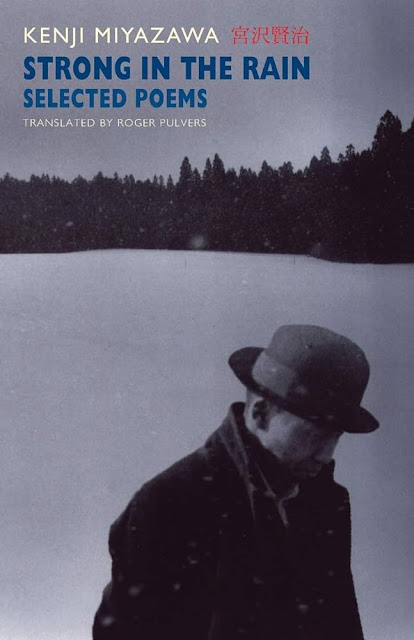Strong in the Rain
Strong in the rain
Strong in the wind
Strong against the summer heat and snow
He is healthy and robust
Free from desire
He never loses his temper
Nor the quiet smile on his lips
He eats four go of unpolished rice
Miso and a few vegetables a day
He does not consider himself
In whatever occurs. . .his understanding
Comes from observation and experience
And he never loses sight of things
He lives in a little thatched-roof hut
In a field in the shadows of a pine tree grove
If there is a sick child in the east
He goes there to nurse the child
If there's a tired mother in the west
He goes to her and carries her sheaves
If someone is near death in the south
He goes and says, 'Don't be afraid'
If there are strife and lawsuits in the north
He demands that the people put an end to their pettiness
He weeps at the time of drought
He plods about at a loss during the cold summer
Everyone calls him Blockhead
No one sings his praises
Or takes him to heart. . .
That is the kind of person
I want to be
_________________________
KENJI MIYAZAWA
Strong in the Rain
translated by Roger Pulvers
Bloodaxe Books, 2007
Kenji's best-known poem remained unpublished in his lifetime. It had been written in his little notebook with the title 'November 3' and discovered after his death. In this poem Kenji gives us a portrait of his ideal life. The 3 November is 1931, less than two years before he died. He wrote his will shortly before writing this poem. Perhaps he saw the poem as a kind of prayful wish for himself in his next life.
Kenji desperately desired to have a strong, robust and healthy body. Needless to say, this is a wish that is common to all people. But Kenji's desire for this contained a motivation that most of us would not claim for ourselves. Like the scorpion in Night on the Milky Way Train that burns its body to provide light and heat, Kenji wanted to use his body for the good of humanity. If you are sickly and weak, what sacrifices can you make for all of the humans who need you?
Kenji was utterly sincere in his wish to suppress and stifle his natural desires. These included natural physical drives such as those for food and sex, as well as material desires, such as those for wealth and comfort. Because of the asceticism inspired in him by his religion, Kenji denied himself these desires. To him, love meant only devotion and sacrifice. One's body must be robust, never sidetracked by worldly desires. The body, like the mind, must always be equal to the task of fulfilling its occupant's holy mission.
His last request to his father, on the morning of 21 September 1933— he died at 1:30 P.M. that same day — was to print up a thousand copies of the Lotus Sutra to distribute to his friends and acquaintances.
______________________
Thirteen years ago (I can't even fathom how time has sped) I posted this poem on the Birdhouse, another translation, in fact I have no idea who was the translator — the poem has been tacked up in my tool room now for almost half a century long, grimy and lasting. It could be Gary Snyder's since it was Snyder's tool & sheathed translations of Kenji Miyazawa I first read in 1969. This latest version of the same poem is translated by Roger Pulvers in Kenji's Bloodaxe publication Strong in the Rain. It's impossible not to share the commentary by Pulvers.
[ BA ]







































